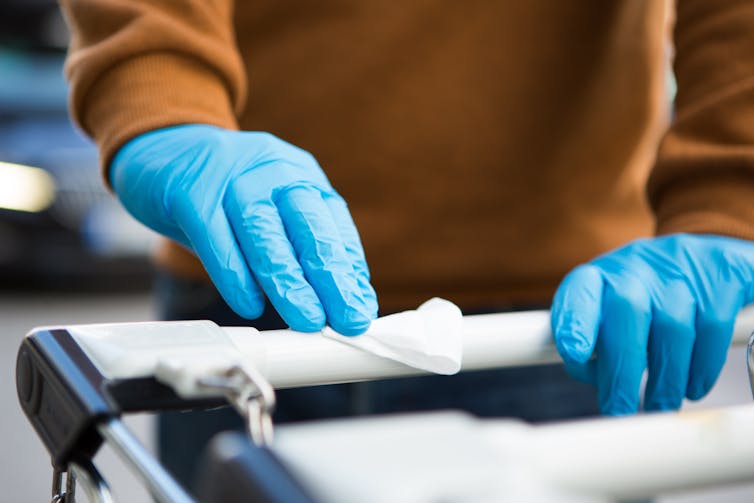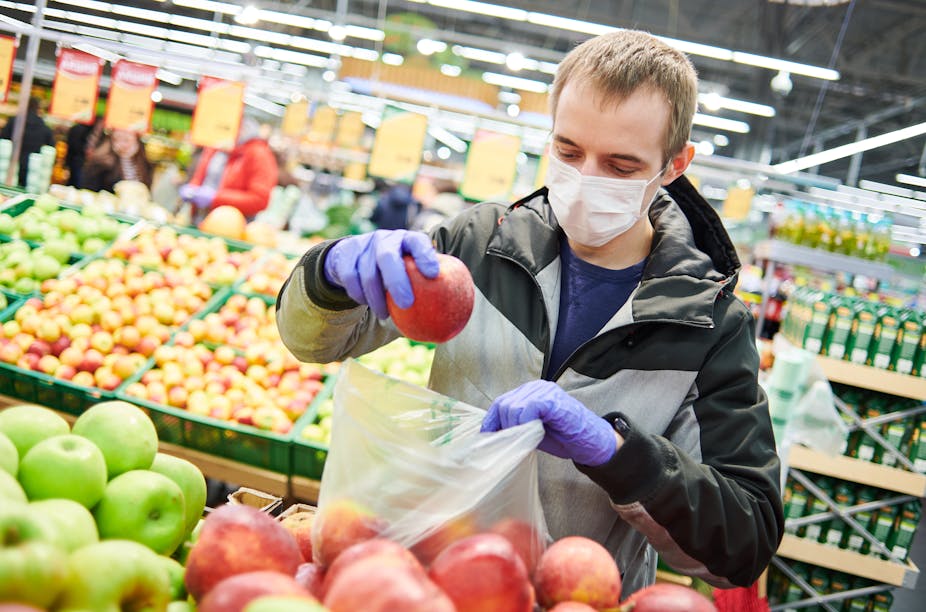For many of us, grocery shopping is when we will come into contact with the highest number of people during the pandemic. The more people we encounter, the higher the risk of virus transmission. So, how do we keep safe when going to the shops?
To become infected, a person needs to be exposed to a certain number of virus particles, but we do not yet know exactly what this number is for SARS-CoV-2, the virus that causes COVID-19. You can be exposed to the virus by breathing it in, or by touching something with viral particles on it, and transferring it to your mouth, nose, or eyes.
Read more: What we do and do not know about COVID-19's infectious dose and viral load
When an infected person coughs, they produce lots of droplets which range in size. Bigger droplets will settle onto surfaces more quickly because of their higher mass. However, smaller droplets will be transported further away from the infected person because their lower mass makes them more easily carried by air currents. The bigger drops carry more virus particles. And the more virus particles you are exposed to, the more likely you are to become infected. This is where the two-metre rule for social distancing comes from: the bigger droplets should not travel beyond two metres.
The bigger droplets will settle onto surfaces and people infected with COVID-19 may contaminate surfaces with the virus by touching them. The coronavirus can also survive on different materials for some time. It can survive for one day on cardboard and three days on plastic and stainless steel.
But the virus is relatively easy to kill. Detergents, alcohol, bleach, and some disinfectants have all been shown to be effective at inactivating coronaviruses.
The surfaces most likely to have the virus on them are those that are touched frequently by lots of people. In a shop, areas such as the trolley and basket handles, the chip and pin machine, or at the self-checkout, are likely to have the highest number of virus particles.
But there are still many ways to keep yourself safe during – and after – your shopping trip.
Stay home if you can
Plan ahead so you don’t have to go to the shops often – and opt for home delivery if possible. If using them, put on your mask or gloves before you go into the store. Use surface cleaning wipes if you brought them, or use those provided in the shop to wipe the trolley or basket handle before you touch it. When queuing, keep a distance of two metres from other people.

Spend as little time in the shop as possible
Try to touch as few things as possible and do not linger for too long in the aisles – especially busy ones. Maintain your distance from others and do not touch your face. It’s fine to ask for help if you need it but try to avoid contact with other people as much as possible.
Keep contact to a minimum
Tills and self-checkouts will both have had lots of people touching them, so these are virus hotspots to avoid. Use contactless payment with a card or phone as much as possible so you don’t have to touch the card machine’s keypad.
Clean your hands
Once you have checked out and left the shop, remove your gloves and dispose of them if you were wearing them. Otherwise, you can wash your hands in the shop toilets or use hand sanitiser with between 60-95% alcohol. Then you can load the shopping in the car and head home.
When you get home, you should give your hands a wash before you unpack the shopping. You can remove outer packaging from some products and dispose of it, though it’s unlikely that the surface of any products will be covered with enough virus to cause an infection.
Read more: Coronavirus: does the amount of virus you are exposed to determine how sick you'll get?
Put everything away into the fridge, freezer or cupboards and then wash your hands again. If you used your own bags, put these somewhere out of the way ready for the next trip. If you used your phone while out shopping, give it a clean as well.
Food preparation
Freezing and cooking should inactivate the virus, although there is currently no evidence that COVID-19 can be transmitted via food in particular. As always, use good food hygiene and make sure you cook everything as directed. Make sure you wash fresh fruit and vegetables thoroughly with water, especially if you will be eating them raw.
Understanding how the virus is transmitted allows us to know what level of risk we are likely to be exposed to during our daily lives under lockdown. It’s important to think things through in advance, weighing up the risks and benefits so you can make the best choices and keep yourself and everyone else safe.

